Of all my unusual experiences at COP26, going on a space safari was perhaps the most unexpected. The UK pavilion had a 3D virtual reality headset, and the enthusiastic young aide was determined I was going to try it. I was pushed for time and anxious to get to my next meeting but after exploring a street in Colombia, he insisted I go on the space safari. I’m so glad he did. Starting by a lake somewhere in the UK, I was lifted heavenwards, always looking back towards the earth, through the startlingly thin atmosphere and up to the International Space Station. From there I could look around into the far reaches of the solar system, almost touch distant stars and then look back to the perfect blue marble of Earth. It took my breath away. It was a profound experience, which moved me to tears. In my headset, the British astronaut Helen Sharman told me that this is what astronauts experience, and it has a name: the overview effect.
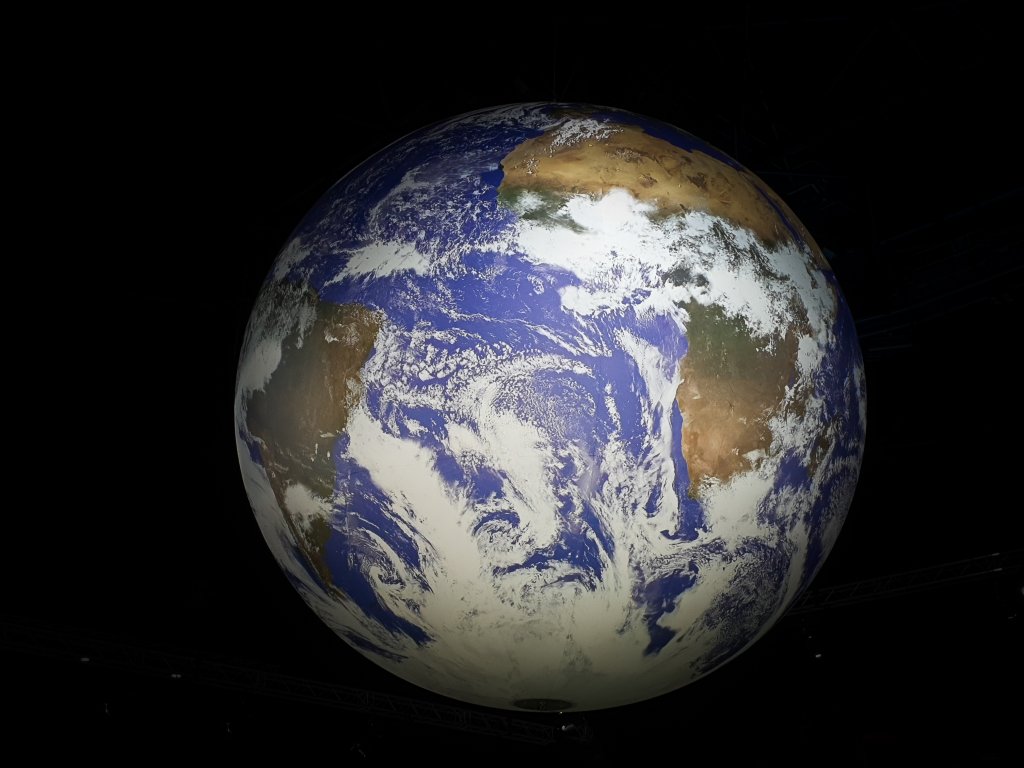 The overview effect
The overview effect
As I gazed at the earth from above, I realised that what astronauts experience physically is what we have – or can have – metaphorically as the Anglican Communion. We too have a different perspective – an overview. We are able to see the whole because we are a global body. And perspective matters.
At the heart of the Blue Zone (the space reserved for delegates to the COP) was a huge, revolving globe. It was beautiful. I assume its purpose was to remind participants of the big picture and of what was at stake, another version of the overview effect. Did it work?
Was COP26 a success or a failure?
I have been asked many times for my “take” on COP26. Was it a success or a failure? It’s a very difficult question to answer because COP isn’t one thing. The Blue Zone is vast with myriad meetings taking place over two weeks. As well as the negotiations between parties, there are many meetings and interactions – some official and some incidental, all of which move the dial.
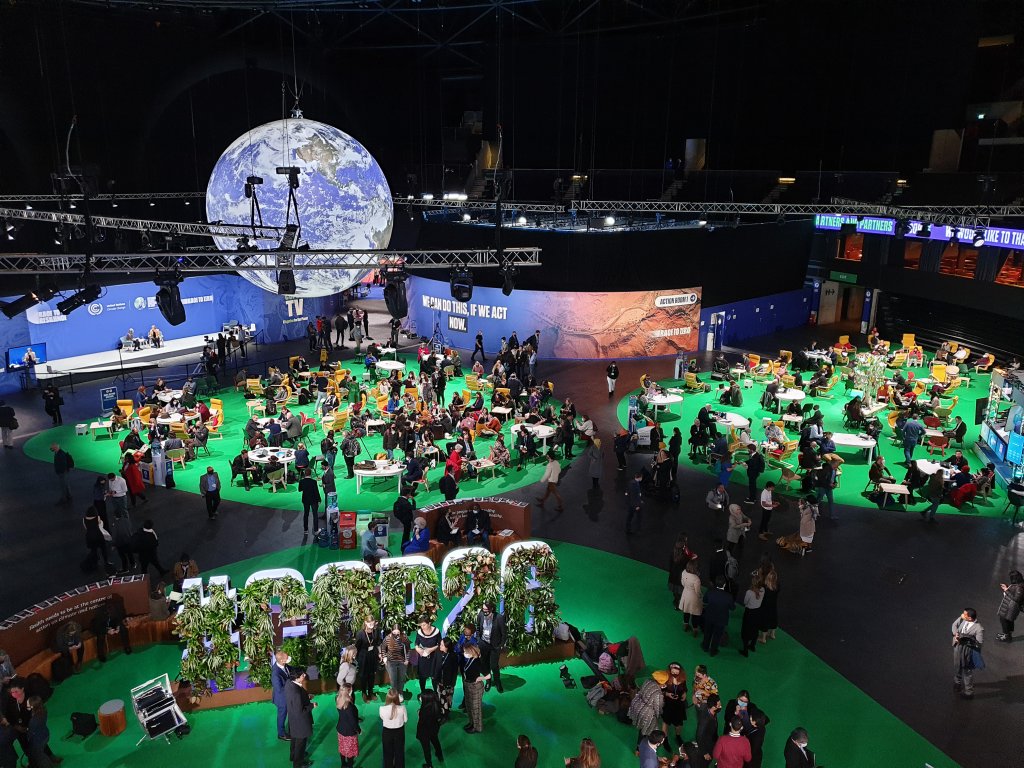 In terms of the negotiated outcomes, expressed in the Glasgow Climate Pact, there were both major disappointments and notable successes. These are summarised by the Anglican Communion’s Permanent Representative to the United Nations, Jack Palmer-White, in this video reflection. As Jack says, “For those for whom climate change is already a matter of life and death, and who are working tirelessly to mitigate and adapt, any outcome will feel gut-wrenching if it falls short of what science tells us is needed now”.
In terms of the negotiated outcomes, expressed in the Glasgow Climate Pact, there were both major disappointments and notable successes. These are summarised by the Anglican Communion’s Permanent Representative to the United Nations, Jack Palmer-White, in this video reflection. As Jack says, “For those for whom climate change is already a matter of life and death, and who are working tirelessly to mitigate and adapt, any outcome will feel gut-wrenching if it falls short of what science tells us is needed now”.
Some have branded COP26 a failure, where nothing happened. I think this is unfair and feeds a narrative of despair. Some things, indeed many good things, happened, as Jack elucidates. These include a pledge by leaders of 120 countries to halt and reverse deforestation by 2030, a methane reduction pledge made by over 100 countries, the creation of a Beyond Oil and Gas Alliance, and the launch of an initiative, signed by 39 countries and organisations, directing their international public support towards the clean energy transition and away from the fossil fuel sector.
There is a world of difference between nothing happening and something happening. But there is also a world of difference between something happening and enough happening. And that’s why people are angry about the outcome. Not enough was done by the negotiators.
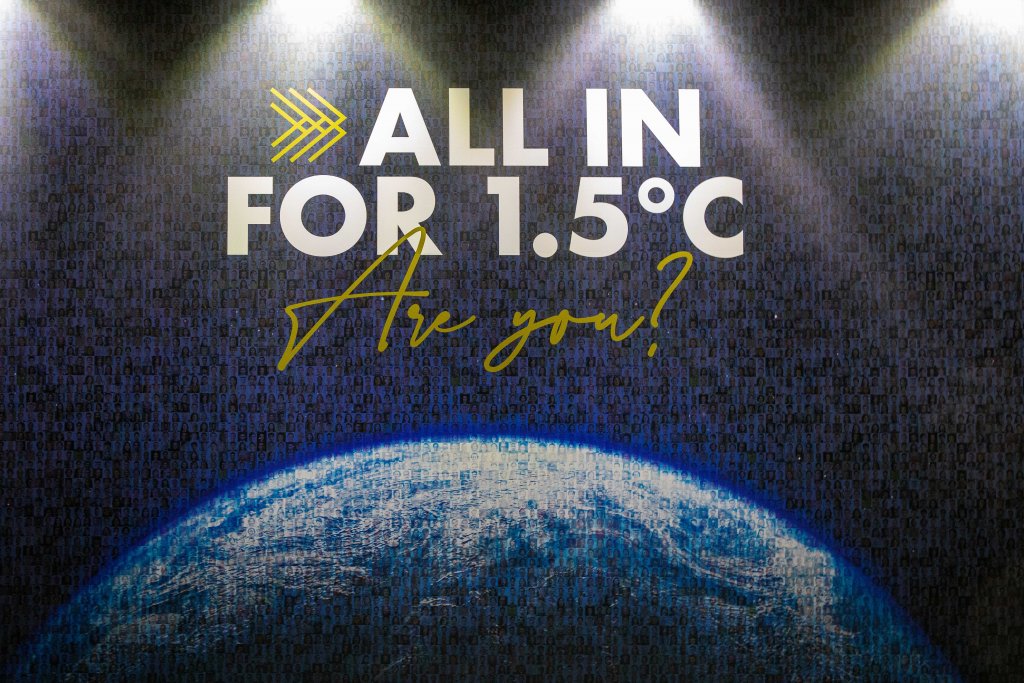 However, the party negotiations were only part of what happened at COP26 and it felt as if the energy was elsewhere. There are three constituencies tackling climate change represented at the COP: the negotiators (parties/governments), industry and civil society. Both industry and civil society are moving fast on climate change. That’s where the energy is and in that I find hope. The fact that it was public anger, rather indifference or resignation, that met the negotiators’ lack of ambition and action is, for me, a sign that the rest of the world is moving faster than the politicians. One day, the negotiators will look up and realise they have been left behind. [Image: logo of the Business Pavilion for Climate Leadership, which brought together businesses and civil society organisations to go all in for 1.5ºC.]
However, the party negotiations were only part of what happened at COP26 and it felt as if the energy was elsewhere. There are three constituencies tackling climate change represented at the COP: the negotiators (parties/governments), industry and civil society. Both industry and civil society are moving fast on climate change. That’s where the energy is and in that I find hope. The fact that it was public anger, rather indifference or resignation, that met the negotiators’ lack of ambition and action is, for me, a sign that the rest of the world is moving faster than the politicians. One day, the negotiators will look up and realise they have been left behind. [Image: logo of the Business Pavilion for Climate Leadership, which brought together businesses and civil society organisations to go all in for 1.5ºC.]
What did the Anglican Communion delegation do at COP26?
COP26 was the first time the Anglican Communion as a whole has been accredited to the United Nations Framework Convention on Climate Change (UNFCCC). This provided significant opportunities the Communion has not previously had. Foremost amongst these were being able to make a formal written submission and to send an Anglican Communion delegation, thereby bringing voices from across the Communion into the UNFCCC, the pre-eminent global decision-making space on climate change.
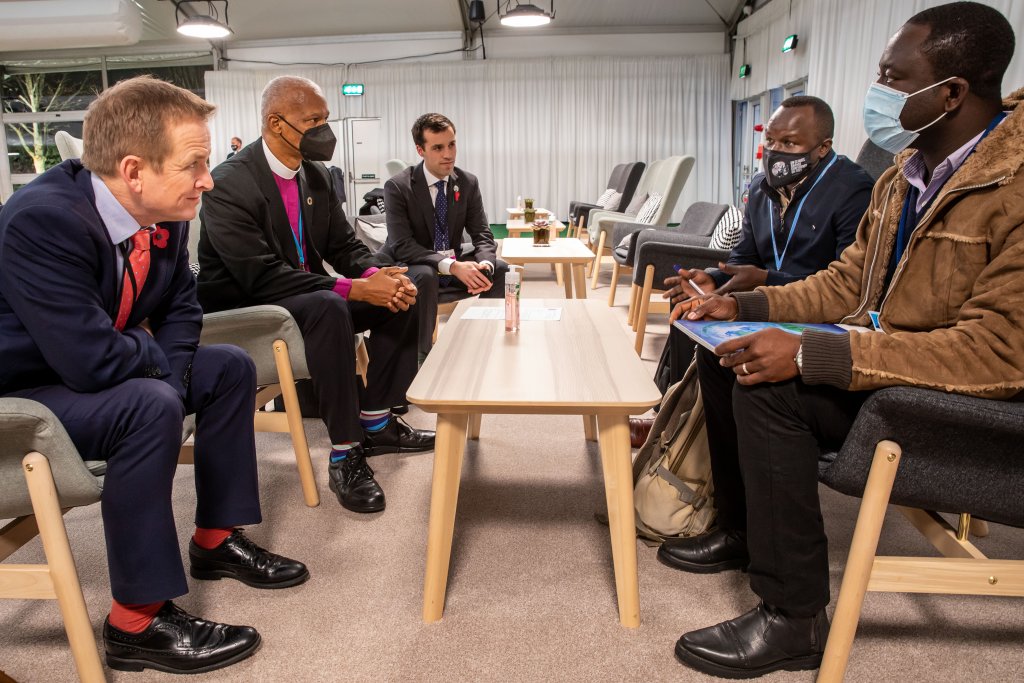
Meeting with Dr John Murton, the UK’s envoy to COP26
Throughout 2021, the ACC COP26 working group has been preparing for COP26, equipping Anglican leadership, developing a policy position paper and identifying a delegation. The policy position paper (summary here; full policy position here) focused on two interconnected policy priorities, climate resilience and just financing, and it highlighted the key voices of Indigenous peoples, youth and women. As well as raising specific policy points, the paper was a way of telling our story: showing how Anglicans across the Communion are affected by climate change and how they are responding. In addition, a voluntary statement was submitted, based on the position paper, which addressed climate resilience, just finance and political courage.
The Anglican Communion’s (or, more accurately, the Anglican Consultative Council’s) official delegation comprised the Most Revd. Julio Murray Thompson, Archbishop of the Anglican Church of Central America and the Anglican Communion’s lead archbishop for the environment, Nicholas Pande from the Council of Anglican Provinces in Africa and Elizabeth Perry from the Anglican Alliance. Sadly, the fourth member of the delegation, Indigenous leader Bernadette Demientieff, was unable to join.
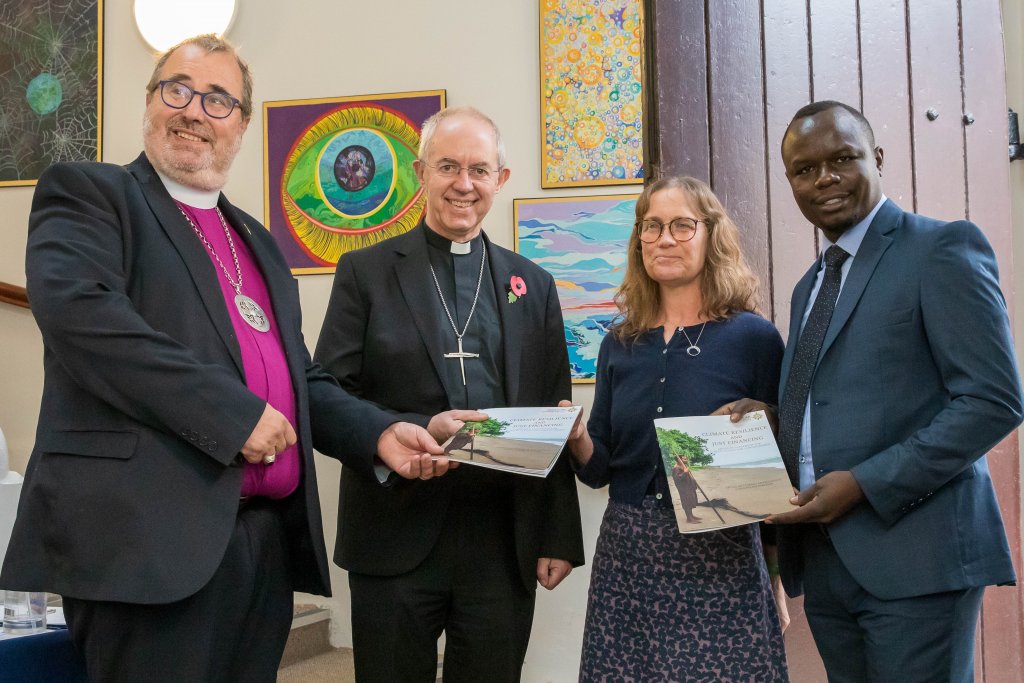
With Archbishop Justin Welby and Primus Mark Strange
Several other Anglicans were also in Glasgow, including the Archbishop of Canterbury, whose presence at the beginning of the COP allowed for higher profile of the Anglican delegation and provided a springboard for further conversation and sharing of our messages. Throughout, the official delegation was wonderfully hosted by the Scottish Episcopal Church.
As well as attending sessions and events in the Blue Zone and elsewhere (and learning more about the issues and processes), the key tasks of the delegation were to share the Communion’s messages and to build relationships. This was done in numerous ways, including with Scotland’s first minister Nicola Sturgeon, with Dr John Murton, the UK’s Envoy to COP26 and with the Papal Nuncio and Holy See delegation, building on the faith and science collaboration earlier this year.
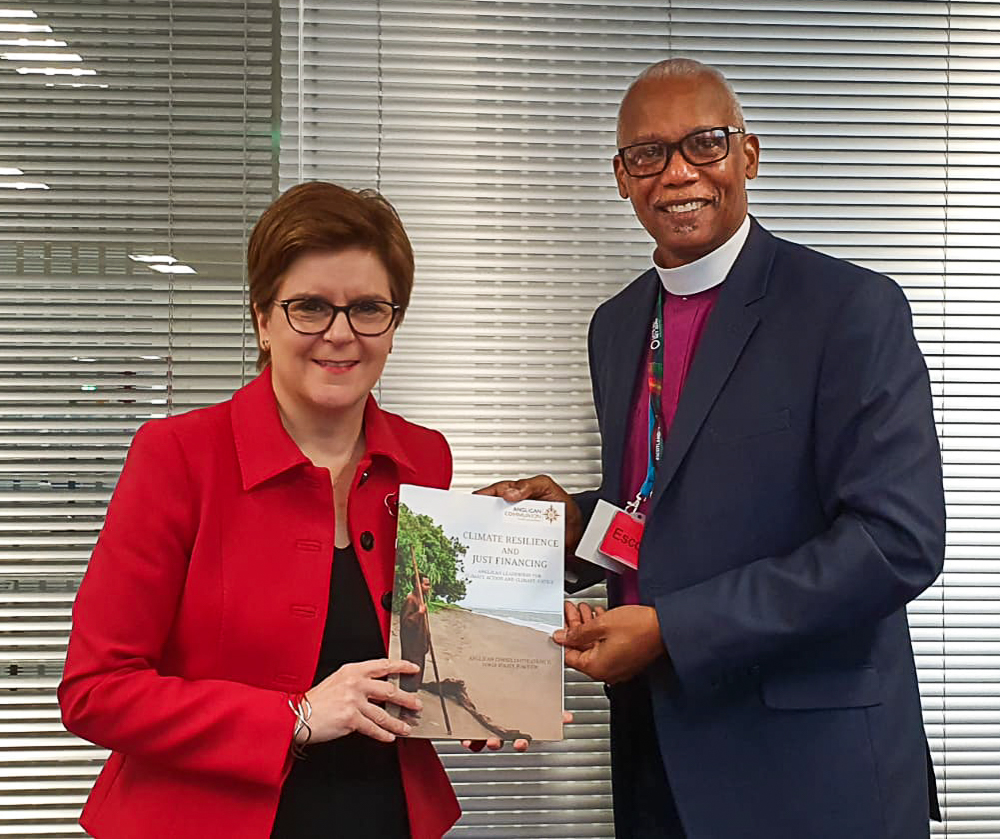
With First Minister Nicola Sturgeon
Whenever opportunity arose, the delegation spoke with people in the Blue Zone, including with the Kenyan Cabinet Secretary, the African Climate Foundation and Nigel Topping, High Level Champion for Climate Action and creator of the Race to Resilience.
We also engaged with Blue Zone events and spaces: Elizabeth took part in an event in Potsdam University’s pavilion on how language and narrative can be used effectively in relation to climate change and Nicholas joined a Kenyan delegation side event, addressing the audience. Elizabeth spent a good deal of time at the Resilience hub (pavilion of the Race to Resilience) and had several conversations about the strategic importance of faith actors in resilience and disaster response.
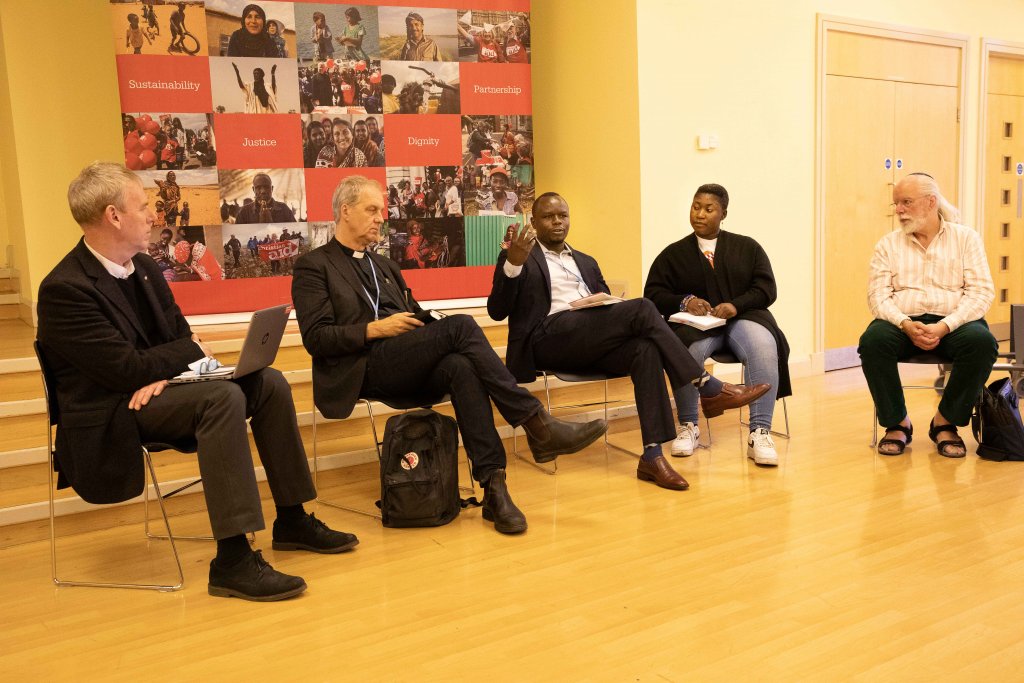 The delegation also took part in local events in Glasgow held in connection with the COP. For example, Nicholas was a panellist in one of Christian Aid’s sessions, live-streamed from their base in Glasgow. Archbishop Julio took part in the handover of the interfaith statement held in St George’s Church, preached at St Mary’s Episcopal Cathedral and fronted the faith bloc of the climate march.
The delegation also took part in local events in Glasgow held in connection with the COP. For example, Nicholas was a panellist in one of Christian Aid’s sessions, live-streamed from their base in Glasgow. Archbishop Julio took part in the handover of the interfaith statement held in St George’s Church, preached at St Mary’s Episcopal Cathedral and fronted the faith bloc of the climate march.
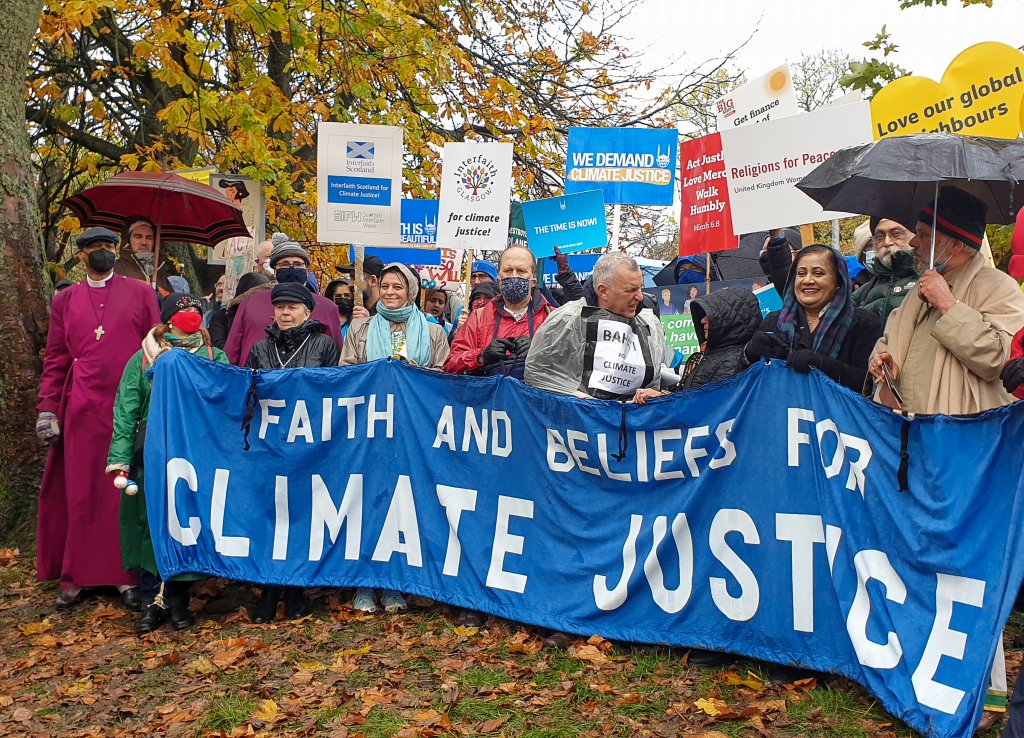 Archbishop Julio was the public face and lead spokesperson for the delegation. He was interviewed for Radio 4’s flagship Sunday programme (first item) and wrote a piece for the Church Times. He also, on behalf of the delegation and Communion, signed the letter from faith leaders urging better outcomes at the end of the COP. Nicholas too was interviewed by the BBC World (Africa) in both English and Swahili, giving the Communion’s message wide reach.
Archbishop Julio was the public face and lead spokesperson for the delegation. He was interviewed for Radio 4’s flagship Sunday programme (first item) and wrote a piece for the Church Times. He also, on behalf of the delegation and Communion, signed the letter from faith leaders urging better outcomes at the end of the COP. Nicholas too was interviewed by the BBC World (Africa) in both English and Swahili, giving the Communion’s message wide reach.
In addition, the Anglican Communion was one of the co-sponsors and organisers of an official side event: Making Peace with Nature: Heeding the Call of Indigenous Peoples (along with The Episcopal Church, World Council of Churches, Religions for Peace and the International Rainforest Initiative). The participants included the Anglican leaders Archbishop Mark MacDonald, the Indigenous Archbishop of Canada, Bishop Francisco Duque (Colombia), Bishop Marc Andrus (USA) and Revd Rachel Taber-Hamilton (USA). The event was picked up by the Religious News Service and the Washington Post.
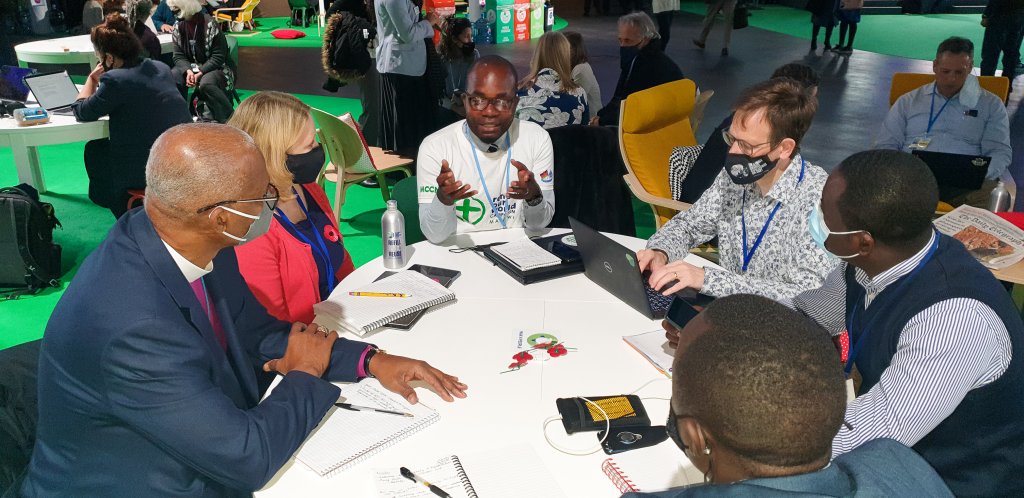
Looking ahead with Tearfund and Renew Our World colleagues
The delegation also spent time building relationships with other Anglicans, with young climate activists, with organisations such as Christian Aid, Renew Our World, Tearfund and the Fairtrade Foundation, and with ecumenical and interfaith partners.
Changing the narrative
Did the Anglican Communion delegation change the outcome of the COP? In terms of policy outcomes and the final Glasgow Climate Pact, no. But then we were never going to. The opportunity to influence policy outcomes is very limited within the intense space of the COP itself, when parties are deep in their negotiations with policy positions already established. The real opportunity to affect policy outcomes is in the time between COPs (which happen annually), advocating with national governments to influence policy positions. This is a vital activity and responsibility of the Church, advocating with our national governments to greater ambition and action, and is discussed further below.
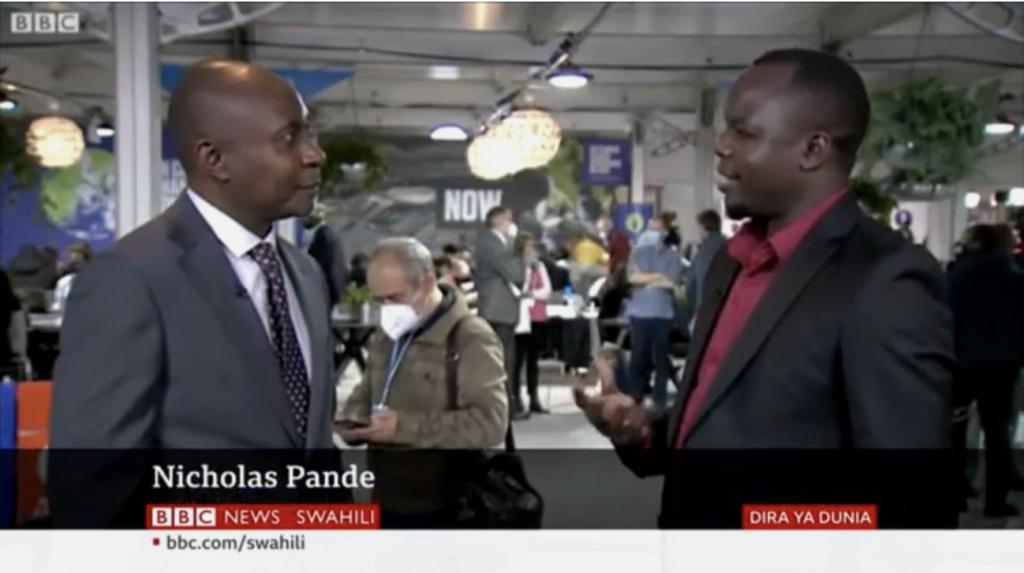
Nicholas being interviewed for BBC World
So, is there any point in being at the COP? Yes. Because the policy outcomes captured in a statement such as the Glasgow Climate Pact are only part of how gatherings such as a COP move the world forwards. Moments make movements. They create and release energy. They catalyse change. They change perceptions and understandings. And that is what I believe the Anglican Communion’s engagement with COPs is equally about. Our task as people of faith is not simply to work to change policies but to change the narrative.
This is where the overview effect comes in. As a Communion, we have something incredibly precious – we are a global, connected body and we have an overview. To quote from our policy paper,
“As a global, connected body with a shared identity that transcends national borders, the Anglican Communion has a distinctive perspective on climate change. Member Churches of the Anglican Communion are involved in every part of the story of climate change. We are the people facing devastation in disaster-stricken communities. We are the polluters in wealthy countries. We wield power and political influence. We are the poor and marginalised. We are investors with financial capital. We are first-responders to disasters and those who accompany communities on the journey through to recovery. We contribute to the problem. We contribute to the solution. We are both local and global. We connect with one another, share our experiences and can leverage our networks and shared identity to mobilise for climate justice and climate action. We therefore do not speak from just one position but from many. We do not only speak to others; we speak also to ourselves.”
The failure, yet again, for a COP to deliver on the commitment made in 2009 to provide $100bn per year in climate finance for adaptation and mitigation comes as no surprise to anyone who has followed the world’s failure to distribute Covid-19 vaccines equitably. It’s the same failure of imagination – the failure to understand that we are in this together; that neither the Coronavirus nor climate change recognise or respect national borders; that no one is safe until, or unless, everyone is safe. Turning inwards and nationalism simply don’t make any sense as a response to a global crisis.
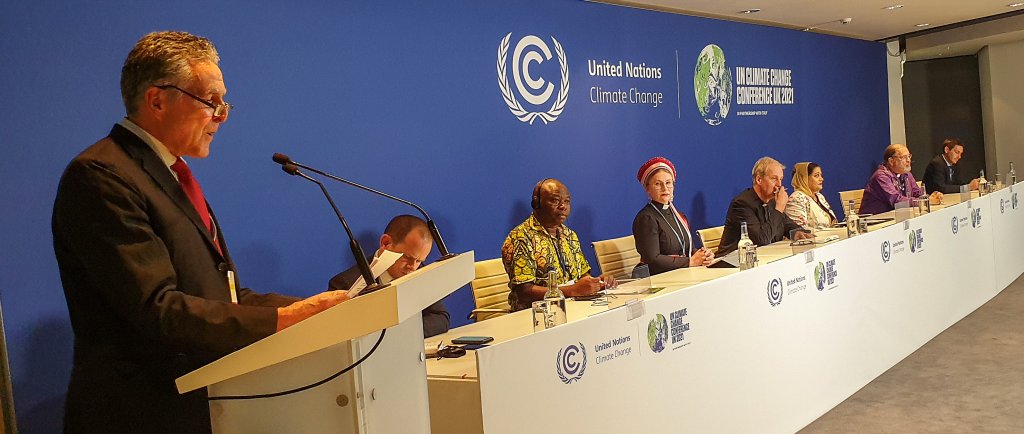
Striving to change the narrative: Heeding the Call of Indigenous People side event
The overview effect is needed. And that’s something the Church can speak to. We see things from a different perspective, and we can help others see things from a bigger perspective too: one of interconnectedness, shared humanity and love for our common home. We can point to realities and possibilities the politicians are failing to grasp. It’s a moral call but it’s more than that – it’s about firing people’s imaginations.
What’s next?
It was a great privilege to represent the Anglican Communion at COP26 and a joy to have positive stories of resilience and climate action from across the Communion to share. I was proud to be an Anglican. But we have so much more to do. So where do we go from here?
In his reflections recorded at the end of the COP, Archbishop Julio talks about the urgent need to build the capacity of Anglican leadership, both current and future, for advocacy and influencing in the area of climate change, especially on Nationally Determined Contributions (emissions reductions), just financing and seeing the Church as strategic partners in disaster resilience and response. Such advocacy is critical. As outlined above, the opportunity to influence parties’ policy positions is between the COPs. In order to deliver this capacity-building, a further series of webinars for Anglican leaders, including youth, is envisaged for 2022. To understand some of the specifics of the advocacy that will be needed in the aftermath of COP26, see this presentation by Nicholas.
As well as working to influence specific policy areas, we need to strive to change the narrative, calling people to a bigger vision of shared humanity, interconnectedness and the common good. We need to call out the false security of nationalism and turning inwards and offer a more compelling vision of cooperation, which is ultimately the only realistic way to achieve security. We need to keep sharing stories of hope and action, both our own, from within the Communion, and others’.
And, of course, we need to be the change we want to see. We need to “discern the body” (1 Corinthians 11:21), seeing how it is affected by climate change and responding in love and faith. We need to find new ways of living the Fifth Anglican Mark of Mission. To quote a speaker at the faiths’ petition handover event, “It is time for us to act, with every sinew of our being, as if we believed that God made the world and that we are part of that wonderful, glorious creation”– and as if it’s worth saving.
As a Communion, there is need to explore how we respond to the loss and damage member churches are already experiencing. How do we work together on mitigation and adaptation? How can we grow the ground-breaking work of the Resilience course which is increasing churches’ capacity for disaster resilience and preparedness, and a stunning example of what we can do together?
As one of the faith bodies who were signatories to the Joint Appeal of faith leaders and scientists released on October 4th at the Vatican, the Anglican Communion committed itself “to taking much more serious action” to address “the crisis of our common home”, saying, “we underline the importance of taking far-reaching environmental action within our own institutions and communities”. Specific commitments included:
- Supporting actions to reduce carbon emissions, achieve carbon neutrality, promote disaster risk reduction, improve waste management, conserve water and energy, develop renewable energy, provide green open spaces, conserve coastal areas, prevent deforestation and restore forests.
- Working to make bold plans to achieve full sustainability in our buildings, land, vehicles and other properties, joining the global race to save our planet.
- Encouraging our communities to embrace simple and sustainable lifestyles at home, so as to reduce our collective carbon footprint.
- Striving to align our financial investments with environmentally and socially responsible standards, ensuring greater accountability and transparency as the tendency to move away from investments in fossil fuels and toward investments in renewable energy and restorative agriculture is becoming ever more widespread.
- Evaluating all the goods we purchase and the services we hire with the same ethical lens, avoiding two different moral standards being applied to the business sector and to the rest of social life. For instance, we will raise awareness in our faith communities about the need to examine our banking, insurance and investment choices, to correct them in line with both the values we proclaim here.
All of this needs resourcing. It will take intentional work, and serious investment in terms of time, energy and money.
Closing thoughts: becoming the widow
In his end-of-COP reflection, Archbishop Julio concludes by saying, “I take this opportunity to thank all the people who have been praying for us and cheering us on as the members of the team got the job done. It has been a tremendous experience.
“This is a time in which we need to think about the parable in Luke 18: 1-8, that widow who came in front of the judge and was persistently requesting justice. That’s an image we need for ourselves as we seek to journey with climate change issues. We need not to stop. We need to continue persistently, praying, asking, questioning, offering information, offering spaces for conversation and dialogue, making sure that the leadership of our church is well-equipped so that when they use their prophetic voice, they use it well-informed, making space for young people to step up and be part of the process, making sure that those most affected are also taken care of and most of all, safeguarding the integrity of creation. We become the widow. We are seeking justice. And we are not going to stop until justice is done.”
By Elizabeth Perry, Advocacy and Communication Manager, Anglican Alliance.
Images: Anglican Alliance / Elizabeth Perry
Please see the Anglican Alliance’s Climate Emergency hub for resources on climate change and stories of how Anglicans across the Communion are responding. There are also prayer resources in the Prayer and Reflection section of our website.
